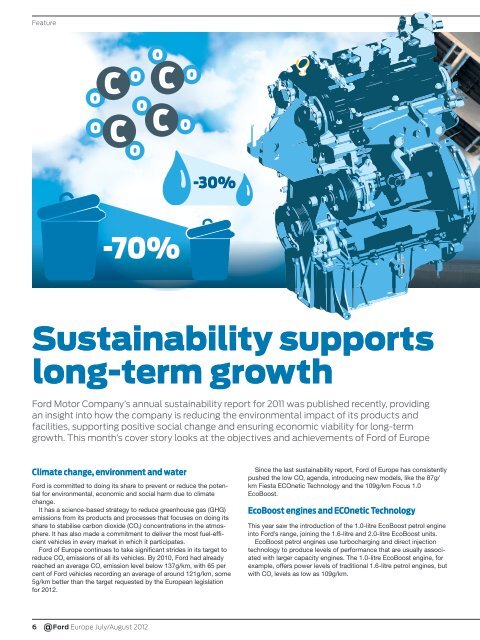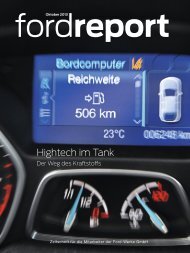“Astonishing!” - Ford
“Astonishing!” - Ford
“Astonishing!” - Ford
You also want an ePaper? Increase the reach of your titles
YUMPU automatically turns print PDFs into web optimized ePapers that Google loves.
Feature<br />
-70%<br />
6 @<strong>Ford</strong> Europe July/August 2012<br />
-30%<br />
Sustainability supports<br />
long-term growth<br />
<strong>Ford</strong> Motor Company’s annual sustainability report for 2011 was published recently, providing<br />
an insight into how the company is reducing the environmental impact of its products and<br />
facilities, supporting positive social change and ensuring economic viability for long-term<br />
growth. This month’s cover story looks at the objectives and achievements of <strong>Ford</strong> of Europe<br />
Climate change, environment and water<br />
<strong>Ford</strong> is committed to doing its share to prevent or reduce the potential<br />
for environmental, economic and social harm due to climate<br />
change.<br />
It has a science-based strategy to reduce greenhouse gas (GHG)<br />
emissions from its products and processes that focuses on doing its<br />
share to stabilise carbon dioxide (CO ² ) concentrations in the atmosphere.<br />
It has also made a commitment to deliver the most fuel-efficient<br />
vehicles in every market in which it participates.<br />
<strong>Ford</strong> of Europe continues to take significant strides in its target to<br />
reduce CO ² emissions of all its vehicles. By 2010, <strong>Ford</strong> had already<br />
reached an average CO ² emission level below 137g/km, with 65 per<br />
cent of <strong>Ford</strong> vehicles recording an average of around 121g/km, some<br />
5g/km better than the target requested by the European legislation<br />
for 2012.<br />
Since the last sustainability report, <strong>Ford</strong> of Europe has consistently<br />
pushed the low CO ² agenda, introducing new models, like the 87g/<br />
km Fiesta ECOnetic Technology and the 109g/km Focus 1.0<br />
EcoBoost.<br />
EcoBoost engines and ECOnetic Technology<br />
This year saw the introduction of the 1.0-litre EcoBoost petrol engine<br />
into <strong>Ford</strong>’s range, joining the 1.6-litre and 2.0-litre EcoBoost units.<br />
EcoBoost petrol engines use turbocharging and direct injection<br />
technology to produce levels of performance that are usually associated<br />
with larger capacity engines. The 1.0-litre EcoBoost engine, for<br />
example, offers power levels of traditional 1.6-litre petrol engines, but<br />
with CO ² levels as low as 109g/km.

















